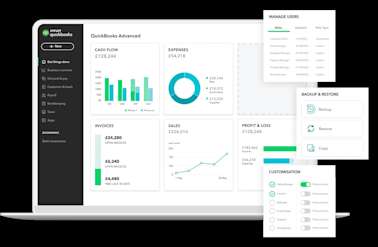
Cloud accounting
Accountant and bookkeeper product update - Your Books is now "Advanced"
Smart accounting software - no commitment, cancel anytime

MY FIRST YEAR
Have you ever considered becoming self-employed?
There are nearly five million of us in the UK who are self-employed now. According to the Office for National Statistics, that figure’s been steadily on the rise for years. Being self-employed must have something going for it.
Self-employment has obvious benefits such as
Flexible hours
Being in control of your work and success
Being your own boss
Working from anywhere you like
Financial benefits such as expensing some utility, travel bills and business insurance from your income.
However, there are disadvantages of being self-employed. You have no regular income, paid holidays or statutory sick pay. You have to pay your own pension as well as submitting your own taxes. There’s a lot more paperwork, and being on your own there’s little or no structure to your day.
You also have to think about start-up costs, do you have the funding to get a business off the ground and if not, where will that money come from?
So before going self-employed, think hard about whether this is the right choice for you. It’s a decision that’ll have quite an impact on your finances and your personal life, so check you have the right skills and character.
When you start out working for yourself, you need to pick your business structure. First off you’ll be classed as a sole trader – even if you haven’t yet told HM Revenue and Customs (HMRC). There are other options though, which you could consider.
A partnership - two or more people share profits, and are jointly responsible for the partnership’s debts
A limited company - its finances are separate from your personal finances
A franchise – the franchisor grants you a licence for running the business under their brand and operating system. The contract can be complicated, so you should get legal advice.
A social enterprise – profits are reinvested into the business or community.
Don’t forget the financial paperwork. First of all, you’ll need to register as self-employed to make sure you pay the correct income tax and National Insurance. The government’s web site has extensive guidance on this.
In April 2024, the arrival of Making Tax Digital will mean the self-employed will have to make sure they are compliant with MTD for income tax rules by keeping digital records and submitting quarterly reports to HMRC. It may be a few years away, but it’s something you’ll need to think about now to avoid penalties.
In this case, you’re not classed as self-employed. You’re both an owner and an employee of your company. There are different rules on tax and National Insurance to follow. To begin with, you’ll need to register your limited company with Companies House.
When it comes to tax, you pay corporation tax rather than income tax. You can minimise your tax bill (quite legally) by paying yourself an income through a combination of salary and dividend payments. An accountant can be useful here with book-keeping and help with your annual tax return. They’ll check you claim all possible tax reliefs, allowances and business expenses as well.
You must register for VAT if your turnover is over £85,000. You can register voluntarily if it suits your business, for example if you sell to other VAT-registered businesses and can reclaim the VAT as a result.
It needn’t be. Accounting software, including accounting “in the cloud” such as with QuickBooks can make it easier to keep track of your income and expenses. Online accounting will automate a lot of the processes which are new to you, and help you adjust to your new status by saving a lot of time.
Did you find this article about becoming self-employed useful? The QuickBooks Blog covers many more business-related topics. It’s all part of the support we offer to small businesses in the UK.
9.00am - 5.30pm Monday - Thursday
9.00am - 4.30pm Friday